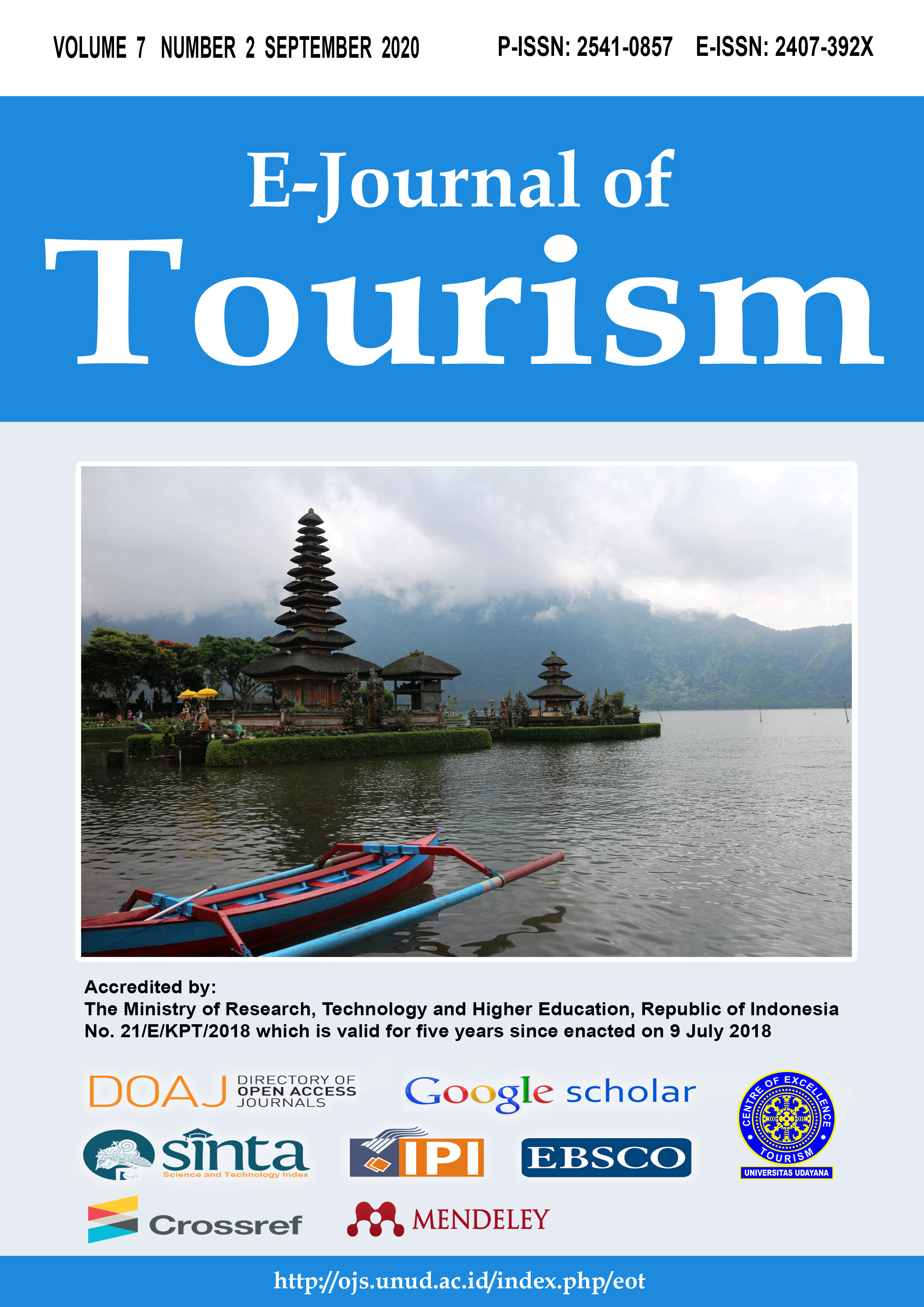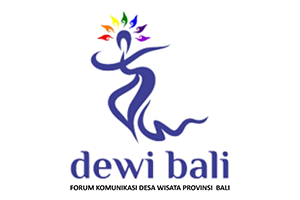Optimization of Sapta Pesona (Seven Enchantments) with Waste Management on Tourist Village Development: Case of Cimande Tourist Village
Abstract
Through the community-based tourist approach, coaching of the Sapta Pesona program is one way to provide knowledge to the community that area they live in is a tourist area. Tourists will visit if the area is safe,orderly, clean, cool, beautiful, friendly and memories. The purpose of this research is to know community public awareness of cleanliness, determine the distribution and volume of waste, the waste management evaluation system that has been carried out, and environmental management at Cimande Tourist Village. The Method of research used is qualitative and quantitative methods in order to obtain more comprehensive, valid, reliable, and objective data. The sample consists of 35 participants of coaching from community of Cimande Village. The factor and regression analysis were used for the data analysis. The results of the study showed that coaching significantly contributed to the community interest in waste management (t = 2.512> t table with a significance of 0.017 (? <0.05). The distribution of the generated waste accumulates in almost every RT (neighborhood) and there are 20 illegal landfill garbage dumps. The author makes a suggestion, Urban Village Head with Pokdarwis, Village Cadres and Youth Organization had to have a program to invite all Cimande community to do environmental cleanliness by mutual cooperation on regularly in order to optimize cleanliness with waste management to achieve Cimande Clean, reach out to people from door to door, making them realize the importance of cleanliness and segregation of waste.
Keywords: Sapta Pesona, Seven Enchantments, Waste Management, Tourist Village, Cimande
Downloads
References
Grant, A. (2003). The Impact of Life Coaching on Goal Attainment, Metacognition and Mental Health. Social Behavior and Personality, 31(3), 253-264.
Hadi Atmoko, P. T. (2014, November). Strategi Pengembangan Potensi Desa Wisata Brajan Kabupaten Sleman. Jurnal Meda Wisata, XII(2), 146-154.
Heriyantara, A., Kasmita, & Waryono. (2015). Pengelolaan Sapta Pesona di Objek Wisata Pantai Padang. ejournal Universitas Negeri Padang.
Hermawan, H. (2016, September). Dampak Pengembangan Desa Wisata Nglanggeran Terhadap Ekonomi Masyarakat Lokal. Jurnal Pariwisata, III(2), 105-117.
Ives, Y. (2008, August). What is 'Coaching' An Exploration of Conflicting Paradigms. International Journal of Evidence Based Coaching and Mentoring, VI(2), 100.
Khalik, Wahyu. 2014. Kajian Kenyaman dan Keamanan Wisatawan di Kawasan Pariwisata Kuta Lombok. JUMPA. I (1). 23-42
Kodoatie, R. J. (2005). Manajemen dan Rekayasa Infrastruktur. Yogyakarta: Pustaka Pelajar.
Masjhoer, J. M. (2017, Mei 2). Kajian Pengelolaan Sampah di Kawasan Wisata Pantai Parangtritis Kabupaten Bantul. Jurnal Kepariwisataan, XI(2), 41-58.
Musa, F. M. (2014). Penerapan Sapta Pesona Pada Desa Wisata Torosiaje Dalam Menunjang Kepariwisataan Di Kabupaten Pohuwato. eprints Universitas Negeri Gorontalo.
Parsloe, E., & Wray, M. (2000). Coaching and Mentoring. Kogan Page.
Prabowo, M. S. (2015). Evaluasi Penerapan Program Sapta Pesona Untuk Meningkatkan Kepuasan Wisatawan Di Wisata Alam Pangjugjugan Kabupaten Sumedang :. Repository Universitas Pendidikan Indonesia.
Roger, C. (1959). A theory of therapy, personality and interpersonal relationship, in Kochm, SW. (ED). Pschology: A study of Science, 184-256.
Siahaan, J. (2016). Prediksi Kondisi Sampah Di Tempat Pengelolaan Sampah Terpadu (TPST) Siosar dan Solusi Pemecahan Masalahnya Dalam Upaya Meretensi Gas Rumah Kaca. Sumatera Utara: Universitas Sumatera Utara.
Stober, D., Wildflower, & Drake. (2006). Evidence-Based Practice: A Potential Approach for Effective Coaching. International Journalof Evidence-Based Coaching, 4(1).
Sugiarto, P., Hendratono, T., & Djoko, S. (2015). Metodologi Penelitian Hospitality & Pariwisata. Tangerang: Matana Publishing.
Sugiyono, P. D. (2016). Metode Penelitian Manajemen (Pendekatan Kuantitatif, Kualitatif, Kombinasi (Mixed Methods), Penelitian Tindakan (Action Research, dan Penelitian Evaluasi). Bandung: Alfabeta Cv.
Taufiq, M. F. (2018, May). Manajemen Pengelolaan Sampah Berkelanjutan Melalui Inovasi "Ecobrick" Oleh Pemerintah Kota Yogyakarta. ResearchGate.
Whitmore, J. (2003). In N. B. Publishing, Coaching for Performance. London.

This work is licensed under a Creative Commons Attribution 4.0 International License.
The copyright of the received article shall be assigned to the journal as the publisher of the journal. The intended copyright includes the right to publish the article in various forms (including reprints). The journal maintains the publishing rights to the published articles.




















